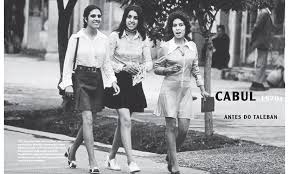
These girls striding out confidently in the 1970s could be anywhere in the western world. In fact, they were in Afghanistan in the days when the country was relatively liberal. Until the Taliban took over – then these happy young women and their daughters and granddaughters were forced to wear burkas, covered up from head to toe in a bid to make them invisible, second class citizens with precious few rights.
So what did these women tell their daughters and their daughters’ daughters of how life used to be?
We in the west are used to our grannies telling us of how life used to be harder, of how they used to work harder, dress more modestly and generally behaved better. They remind us of how lucky we are, of all the opportunities we have for education, freedom and ambition.
But Kabul grannies must tell their granddaughters a different story. When the Taliban were at their most oppressive memories of mini skirts and music and university must have been like fairy tales from some long-forgotten age.
That’s one of the ideas I explore in Amity and the Angel . In a society where religion rules and girls are just meant to be subservient to men, marry young and have lots of babies, it’s the granny with the long memory who’s the rebel, reminding people that there’s another way to live, a society with music and stories, where men and women are equal and free.
Well, someone has to keep the ideas alive. And you can always rely on Granny…
